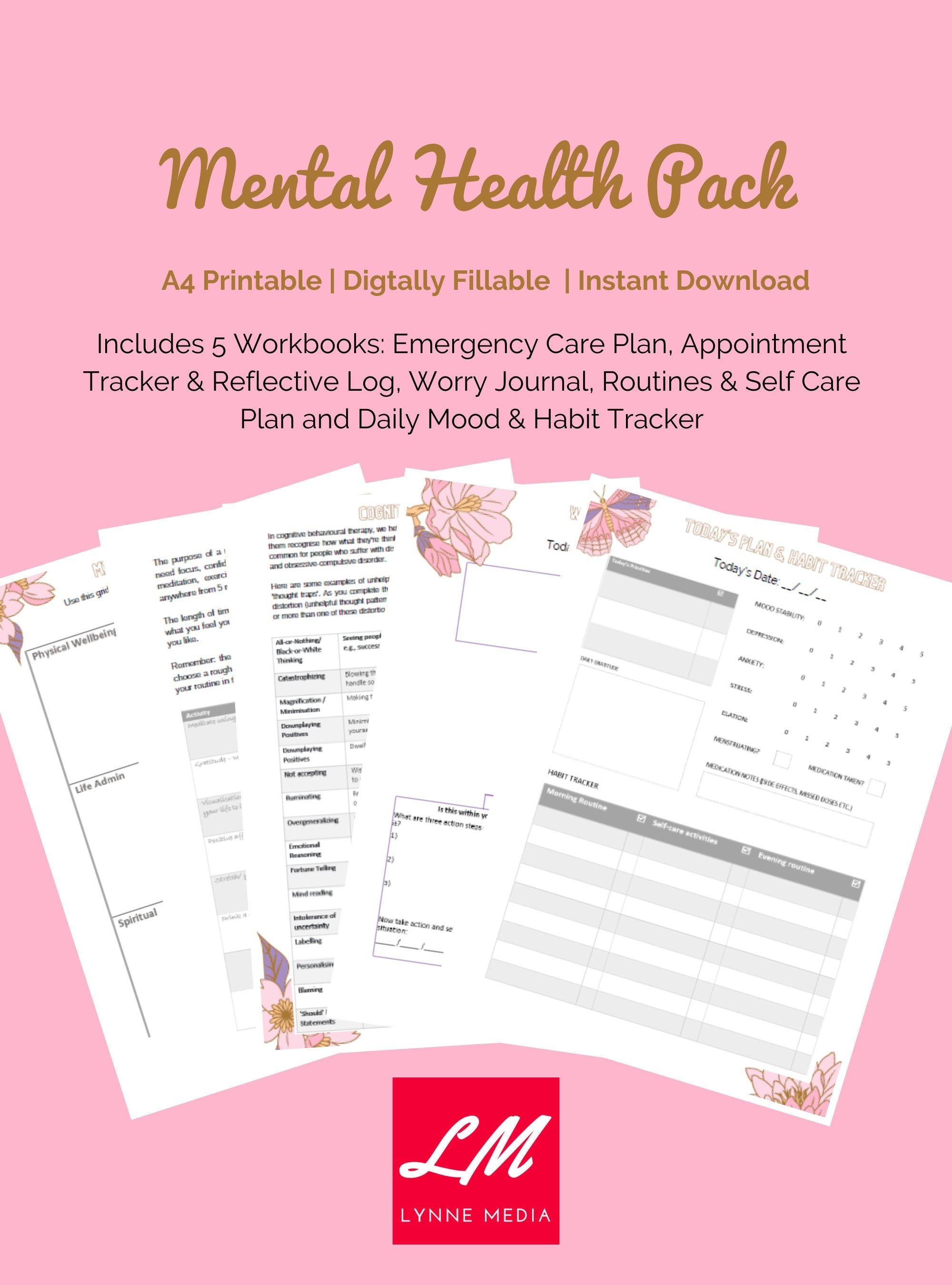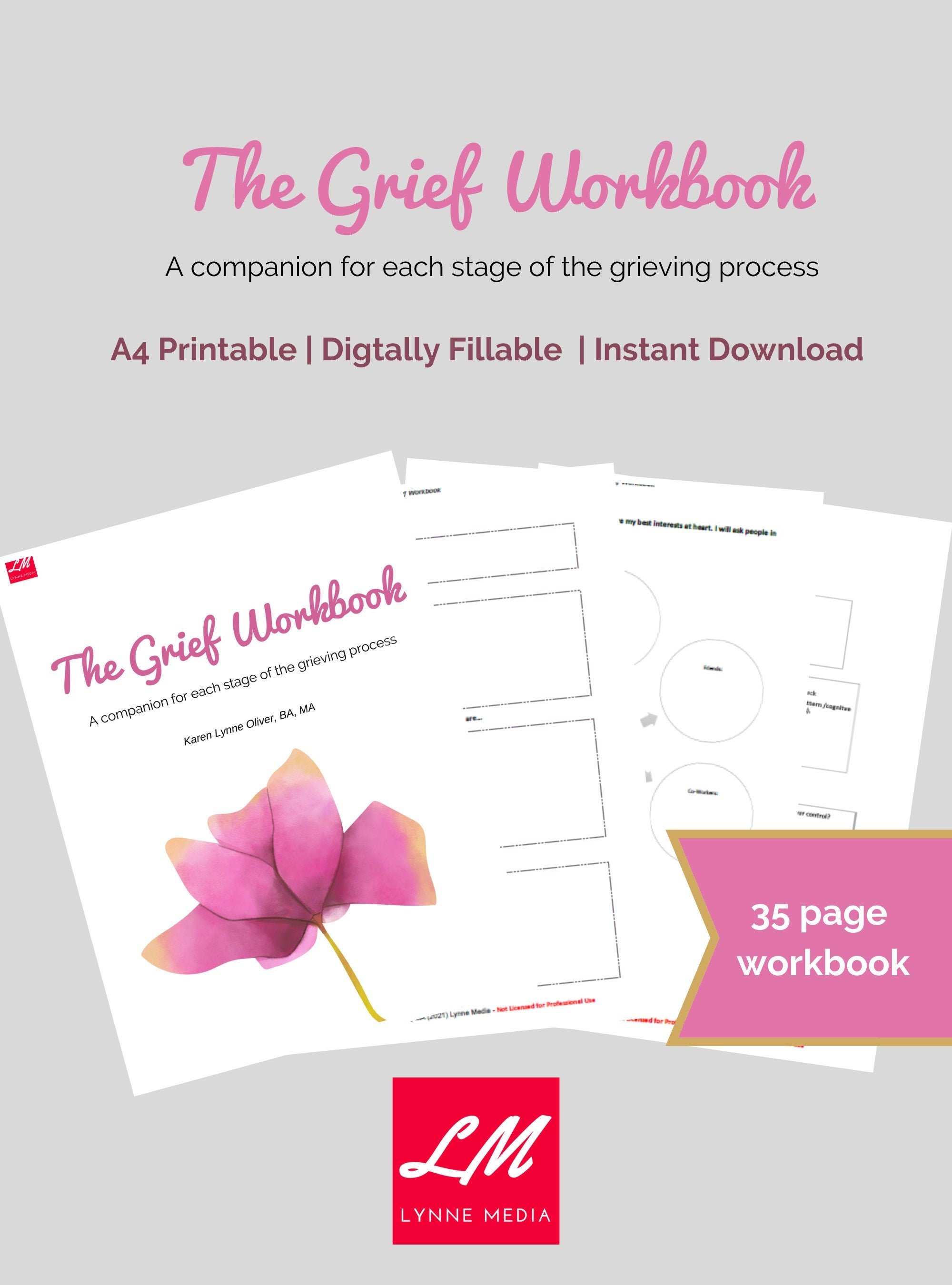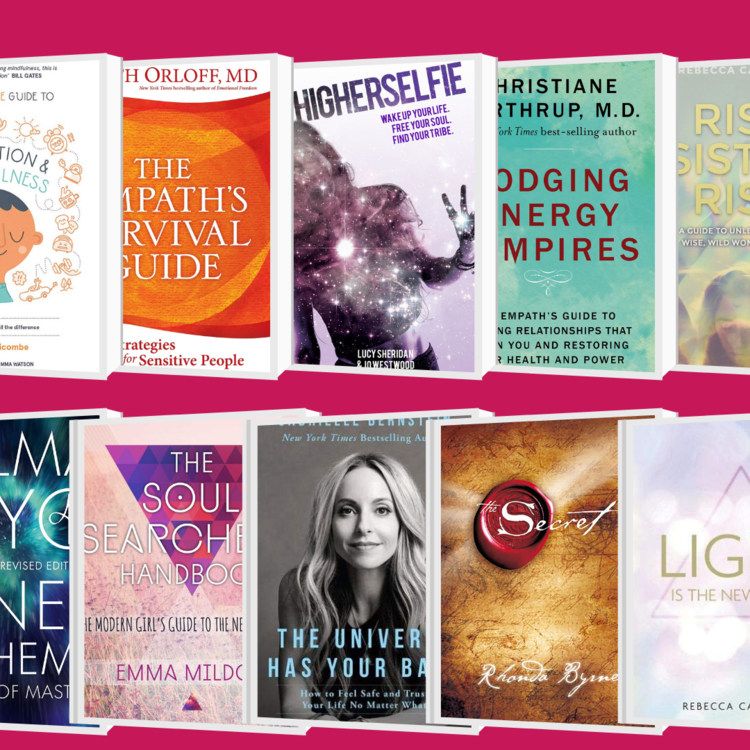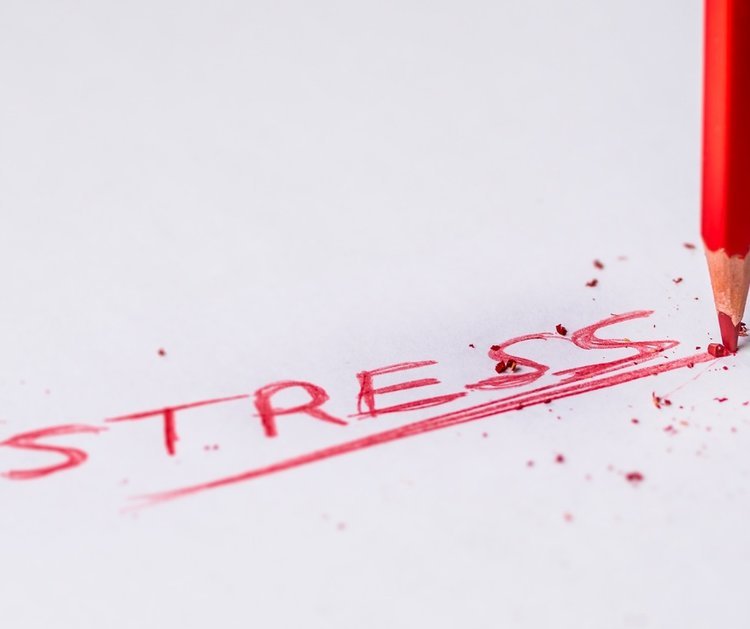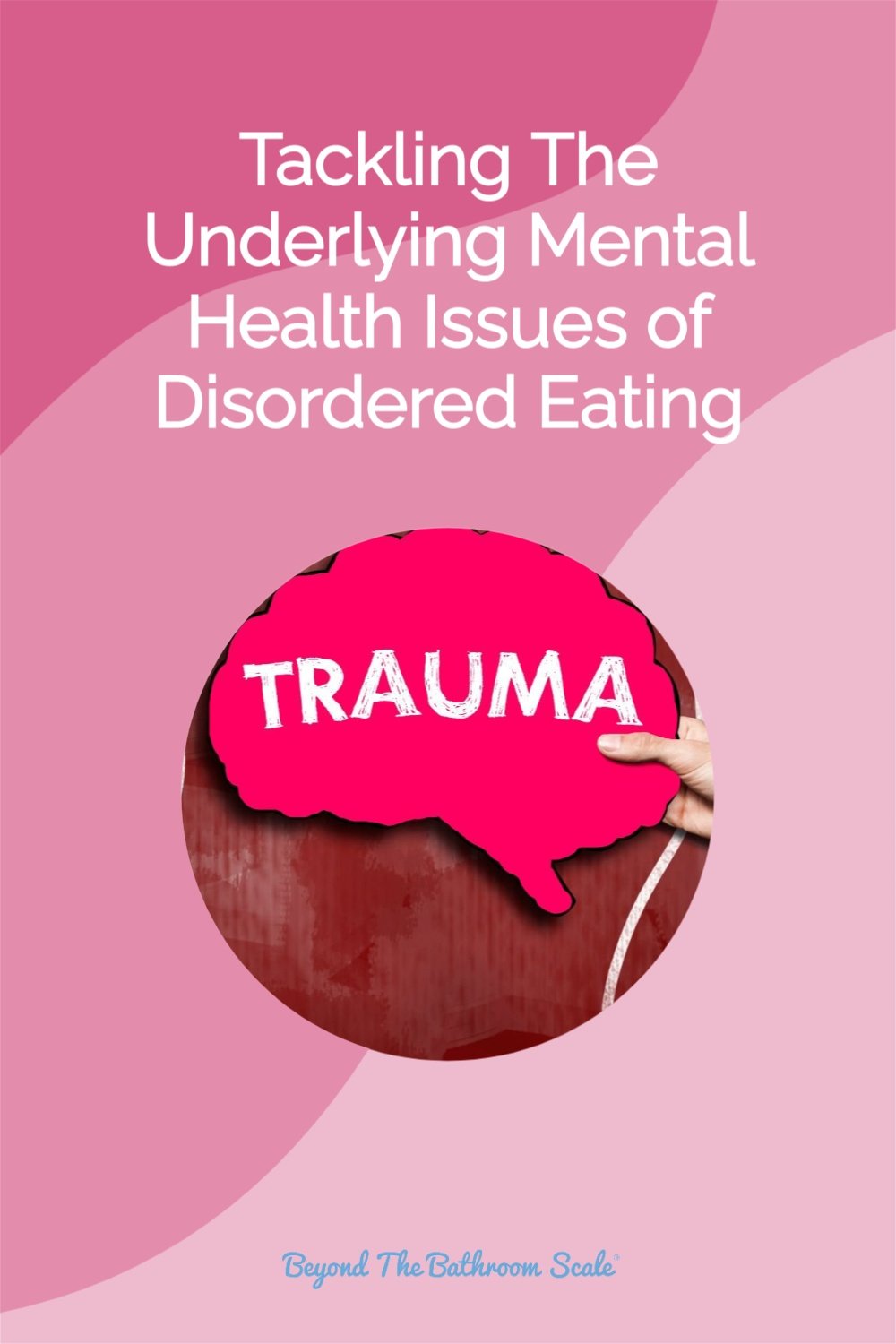
Mental Health Self Help Resources
Mental health issues such as trauma, anxiety and depression often co-exist with disordered eating and negative body image
Healing from body shaming, eating disorders, and a lifetime of dieting can take a toll on our mental health.
It’s also highly likely that you’ll uncover past trauma such as childhood memories, or bring recent issues to the forefront of your mind, such as grief, stress, anxiety and relationship issues.
Doing ‘the work’ around eating disorder recovery is not complete without tackling these underlying issues. You may do this in formal therapy, such as counselling or CBT, or you may take a self-help approach (my therapy workbooks are designed to help you with this).
If at any point, doing this work becomes too challenging for you, practice self-care and reach out to the charities on my list of emergency support resources.

Touch can feel overwhelming or even threatening after trauma, leaving many people confused by their own reactions. This post explores why the body responds this way and offers gentle, trauma-sensitive steps to rebuild safety, boundaries and connection with your physical self at your own pace.
Trauma isn’t just a story from the past—it’s an imprint your body continues to carry. In this gentle, therapist-informed guide, we explore how trauma lives in the body through somatic memory and dissociation, and how you can begin reconnecting with yourself through compassion, pacing, and safety. This is for anyone who feels disconnected from their body and longs to return to it slowly, without pressure or judgment.
When weight loss feels like control or protection, it can quietly become a way to survive trauma. This post explores why shrinking sometimes feels safe, the hidden costs of this coping mechanism, and how to begin finding security in your body without relying on restriction or disappearance.
Maintaining recovery from an eating disorder involves ongoing commitment and practical strategies. From building a strong support network and establishing a routine to practicing mindful eating and setting realistic goals, this guide provides essential tips to help you stay on track. Dive into our Course Library for comprehensive resources and support designed to empower you on your recovery journey and foster lasting well-being.
Unlock the secrets to balancing nutrition and mental health with our comprehensive guide. From embracing nutrient-dense foods to practicing mindful eating, discover actionable tips to support both your body and mind. Ready to take your wellness journey further? Explore our Intuitive Eating Course for in-depth guidance on creating a diet that fosters holistic well-being and a healthier relationship with food.
Ready to enhance your well-being? Explore 10 daily habits that nourish both your mind and body, from starting your day with mindfulness to embracing self-compassion. These practical tips will help you build a foundation of holistic health. For continued support and guidance, check out our Course Library, featuring expert resources on managing stress, intuitive eating, and more. Begin your journey to a balanced life today!
Struggling with emotional eating? You’re not alone. Discover five empowering strategies to cope with your emotions without turning to food. From mindful breathing to creative expression, these techniques will help you break free from the cycle of emotional eating and build a healthier, more compassionate relationship with yourself. Ready to dive deeper? Our Emotional Eating course offers the guidance and tools you need to make lasting change.
Emotional eating is more than just a habit—it’s a response to our deepest feelings. Understanding what triggers emotional eating and learning how to manage it can transform your relationship with food and your emotions. Ready to take control? Our Emotional Eating Course offers the tools and insights you need to break the cycle with compassion and confidence.
This Valentine’s Day, celebrate the most important relationship in your life—the one with yourself. Learn how to embrace self-love and self-care with simple yet powerful practices that honor your worth. Ready to take your self-love journey further? Our Body Image Course offers the tools you need to build lasting self-compassion and body acceptance.
Embrace the power of self-love with 10 simple daily practices that nurture acceptance and compassion. From setting boundaries to practicing gratitude, these habits will help you build a stronger sense of self-worth. Ready to deepen your journey? Explore our Course Library for resources designed to support your mental and physical well-being.
Kickstart the New Year with a mindful approach to goal-setting. Our guide offers practical tips for creating achievable intentions that align with your values and foster personal growth. From setting SMART goals to cultivating a growth mindset and building a supportive environment, discover how to make your resolutions stick. Ready to take your personal development further? Explore our comprehensive Course Library for resources on body image, intuitive eating, stress management, and more to support your journey throughout the year.
As the festive season unfolds, the pressure to please everyone can be overwhelming. But what if this year, you chose to prioritize your well-being? Discover the transformative power of saying no and setting healthy boundaries that allow you to protect your mental and emotional health. Ready to take your self-care journey further? Our Course Library offers the support and resources you need to thrive all year round.
Step into the New Year with a renewed mindset and embrace personal growth like never before. This guide offers practical tips for fostering positivity, setting flexible goals, and building resilience to navigate change. Ready to support your journey further? Explore our comprehensive Course Library for resources on body image, intuitive eating, stress management, and more. Transform this year into a journey of meaningful growth and self-discovery.
The festive season is a time of joy, but it can also bring stress and self-criticism. This year, prioritize yourself by embracing self-love. From setting compassionate boundaries to creating a morning ritual, learn how to nurture your well-being during this busy time. Ready to deepen your self-care journey? Our Course Library offers the tools and guidance you need to support your mental and physical health all year round.
Self-care isn’t just a buzzword—it’s a vital part of nurturing your well-being. In this post, we guide you through creating a personalised self-care routine that truly supports you. From understanding your needs to choosing activities that resonate, you’ll learn how to build a routine that fits seamlessly into your life. Ready for more? Our Course Library offers the tools and guidance you need to take your self-care to the next level.
What if you treated yourself with the same kindness you offer others? Our latest post explores the importance of self-compassion and how it can transform your well-being. Learn practical tips for being gentler with yourself, embracing imperfections, and fostering emotional resilience. Ready to take the next step? Explore our Course Library for supportive resources on your self-compassion journey.
Feeling overwhelmed by the festive rush? Our latest guide offers essential tips for taking care of your mental and physical health during Christmas and New Year’s. Learn how to embrace balance, practice mindfulness, set realistic boundaries, and stay connected with loved ones. Ready to make self-care a priority? Explore our Course Library for resources on body image, intuitive eating, stress management, and more.
Feeling overwhelmed by the festive rush? Our latest post offers practical tips to help you stay mindful and balanced during Christmas and New Year’s. Learn how to set intentions, practice self-care, and embrace the season with joy and ease. Ready to navigate the festivities with calm? Discover more in our Online Course on Overcoming Stress and Anxiety.
Feeling overwhelmed by stress and unsure where to start? This post guides you through creating a personalised stress-relief routine that fits perfectly into your life. Discover practical tips for identifying stress triggers, exploring various techniques, and integrating simple yet effective practices into your daily schedule. Ready to find balance and calm? Explore our online course on overcoming stress and anxiety, featuring cognitive behavioural therapy and practical tools to support your journey.
Feeling overwhelmed by stress? This post explores how mindfulness can be your quick fix for calming your mind in just minutes. Discover simple techniques like mindful breathing and body scans that you can integrate into your daily routine to manage stress and anxiety effectively. Ready to dive deeper? Check out our online course designed to help you overcome stress and anxiety with cognitive behavioural therapy, complete with video lessons and practical worksheets.
Discover how stress and anxiety can profoundly impact your eating habits, from emotional eating to loss of appetite. Our latest post explores this powerful connection and offers practical strategies to help you break the cycle and develop a healthier relationship with food. Ready to take control of your well-being? Learn how our cognitive behavioral therapy-based course can provide the tools and support you need to manage stress and anxiety effectively.
Feeling overwhelmed by stress and anxiety? Our latest post offers 10 simple techniques to help you manage and reduce these feelings, from deep breathing and mindfulness to creative activities. These easy-to-implement strategies can bring more calm and balance to your life. Plus, discover how our online course, based on cognitive behavioral therapy, can provide additional tools and support for overcoming stress and anxiety.
Researchers think there are many people with eating disorders who are also suffering from symptoms of post-traumatic stress disorder, or PTSD. There are strong links between eating disorders and a history of childhood sexual abuse and/or adult rape.
Spirituality is a topic that doesn’t come up very often in eating disorder recovery circles and it may not feel relevant to everyone. But for some, a sense of spirituality or even religion can be a source of support, strength and resilience. Don’t worry, I’m not going to preach to you in this post! I’m simply discussing some of the benefits of spirituality that I’ve personally experienced during my mental health recovery, which also helped strengthen my relationship with my body, and learning to trust it, as well as getting to know my body’s signals and connecting to my inner knowing/intuition.
Stress, and stress-related illnesses and symptoms are on the rise, and there’s no doubt that COVID-19 has compounded what was already a huge problem for society. In this article, I will explain why stress is so damaging for your health and illustrate how many of the health problems we associate with weight, can be alleviated or managed by tackling mental health rather than fixating on dieting or weight loss.
A comprehensive guide to the different types of talking therapy available, including Cognitive Behavioural Therapy (CBT), Dialectical Behavioural Therapy (DBT), Counselling, Psycho-dynamic counselling and Psychotherapy. I also include links to therapist directories and a guide to choosing the right mental health professional for you.
Do you feel more ‘in control’ of your life on some level, when you're restricting or micro-managing your weight, food and exercise? Here's how to handle that.
Emotional eating is NOT an eating problem. It's a coping mechanism for difficult emotions and therefore cannot be treated by dieting or restricting foods. To overcome emotional eating you must learn how to manage your emotions, here's how.
Are you tired? Do you suffer from headaches, backaches or pelvic discomfort? Do you experience depression or feel anxious? Do you have allergies, rashes or autoimmune issues? Have you lost your sex drive? Dr Rachel Carlton Abrams' new book, Body Wise, might just hold the answers.
We have three types of energy: Physical, Mental and Emotional. Here are ten self care tips for restoring three of these.


